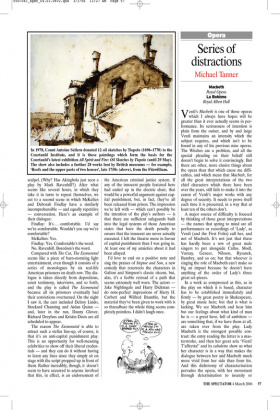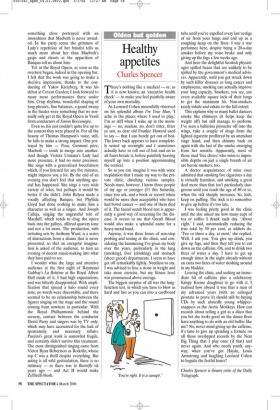Series of distractions
Michael Tanner
Macbeth Royal Opera La Bohème Royal Albert Hall
Verdi’s Macbeth is one of those operas which I always have hopes will be greater than it ever actually seems in performance. Its seriousness of intention is plain from the outset, and by and large Verdi maintains an intensity which the subject requires, and which isn’t to be found in any of his previous nine operas. The Witches are a problem, and all the special pleading on their behalf still doesn’t begin to solve it convincingly. But there are other, more elusive things about the opera than that which cause me difficulties, and which mean that Macbeth, for all the great interpretations of the two chief characters which there have been over the years, still fails to make it into the canon of Verdi’s major works with any degree of security. It needs to prove itself each time it is presented, in a way that at least ten of the others don’t.
A major source of difficulty is focused by thinking of those great interpretations — the names that spring to mind are all performances or recordings of ‘Lady’, as Verdi (and the First Folio) call her, and not of Macbeth. It’s not just that there has hardly been a row of great male singers to put alongside Callas, Modl, Varnay, Gencer, Nilsson, Rysanek, Bumbry, and so on; but that whoever is singing the role of Macbeth can’t make so big an impact because he doesn’t have anything of the order of Lady’s three great set-pieces.
In a work as compressed as this, as in the play on which it is based, character has to be established immediately and firmly — by great poetry in Shakespeare, by great music here; but that is what is lacking. We see Macbeth and hear him but our feelings about what kind of man he is — a great hero, full of ambition are something that, if we have them at all, are taken over from the play. Lady Macbeth is the strongest possible contrast: the entry reading the letter is a masterstroke, and then her great aria ‘Vieni! T’affretta!’ and its cabaletta show us what her character is in a way that makes the dialogue between her and Macbeth much more vivid from her side than from his. And this dichotomy of characterisation pervades the opera, with her movement through determination to insanity or something close portrayed with an inwardness that Macbeth is never awarded. In the party scene the grimness of Lady’s repetition of her brindisi tells us much more about her than Macbeth’s gasps and shouts at the apparition of Banquo tell us about him.
Yet at the Royal Opera, as soon as the overture began, indeed in the opening bar, I felt that the work was going to make a decisive impression, thanks to the conducting of Yakov Kreizberg. It was his debut at Covent Garden; I look forward to many more performances there under him. Crisp rhythms, wonderful shaping of long phrases, fine balances, a grand sweep in the finales were something that we normally only get at the Royal Opera in Verdi from conductors of Simon Boccanegra.
Even so, his cast couldn’t quite live up to the context they were placed in. For all the beauty of Thomas Hampson’s voice, still, he fails to make a strong impact. One portrayal by him — Posa, Germont père, Macbeth — tends to merge into another. And though Violeta Urmana’s Lady had more presence, it had no more precision. She sings with a generalised forcefulness which, if you listened for any five minutes, might impress you a lot. By the end of an evening you don’t feel that anything special has happened. She sings a very wide variety of roles, but perhaps it would be better if she didn’t. John Relyea made a vocally affecting Banquo, but Phyllida Lloyd had done nothing to make him a character as well as a singer. And Joseph Calleja, singing the ungrateful role of Macduff, which tends to drag the opera back into the galleys, offered quavery tone and not a lot more. The production, with irritating sets by Anthony Ward, is a series of distractions from a drama that is never presented, so that an energetic imagination is asked of the audience, to turn an evening of decent music-making into what they have paid to see.
I wonder what the large and attentive audience at the first night of Raymond Gubbay’s La Bohème at the Royal Albert Hall made of it. I had high expectations, and was bitterly disappointed. With amplification that spread a halo round every note, no words were discernible, and there seemed to be no relationship between the figures singing on the stage and the sound coming from nowhere in particular. With the Royal Philharmonic behind the scenery, contact between the conductor David Parry and singers was by TV only, which may have accounted for the lack of spontaneity and necessary rubato. Puccini’s great work is somewhat fragile, and certainly didn’t survive this treatment. The most distinguished singing came from Victor Ryan Robertson as Rodolfo, whose top C was a thrill despite everything. But acting is all wild gesticulation, there is no intimacy — as there was in Butterfly six years ago — and Act II would make Zeffirelli blush.











































































 Previous page
Previous page